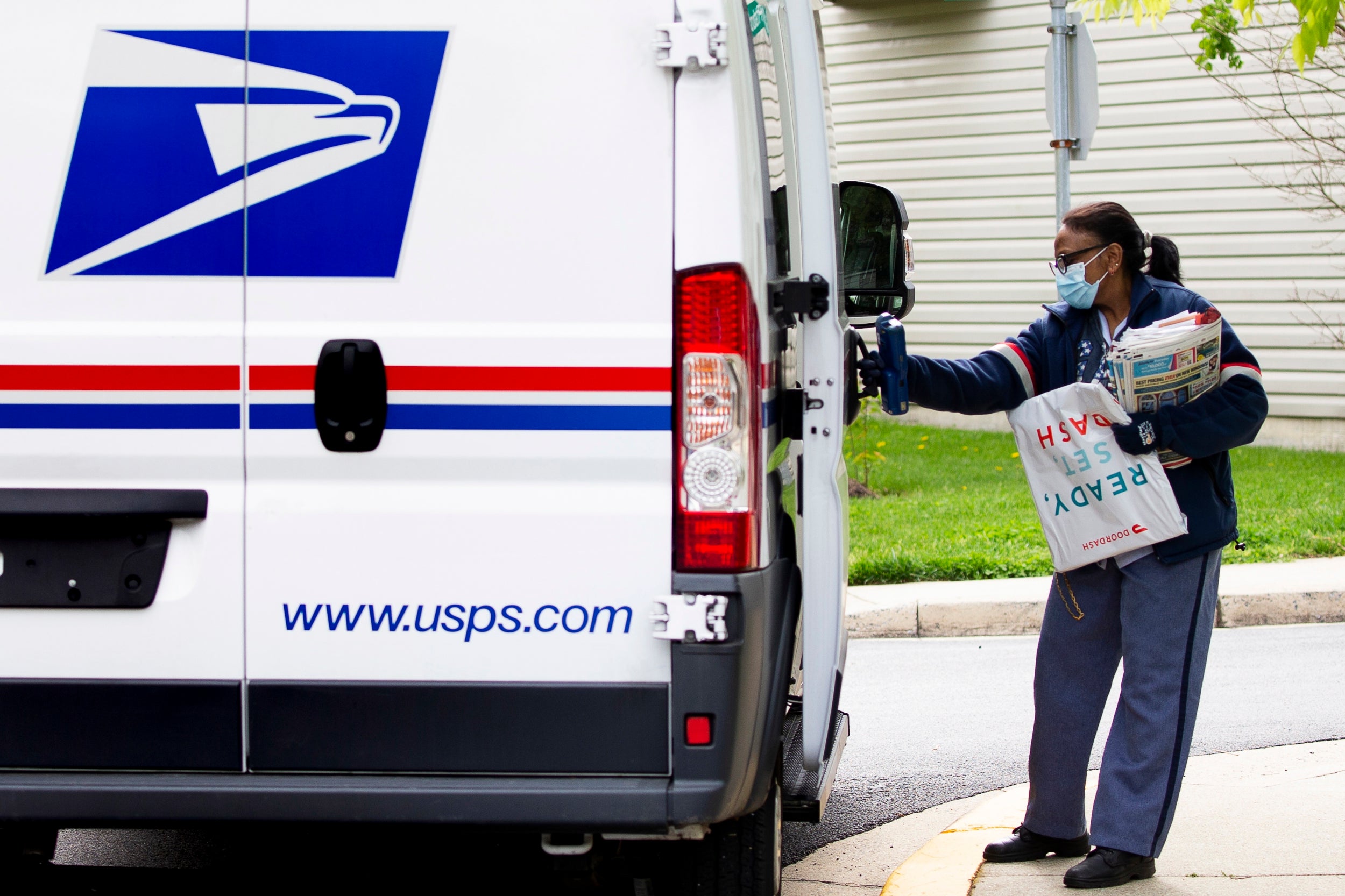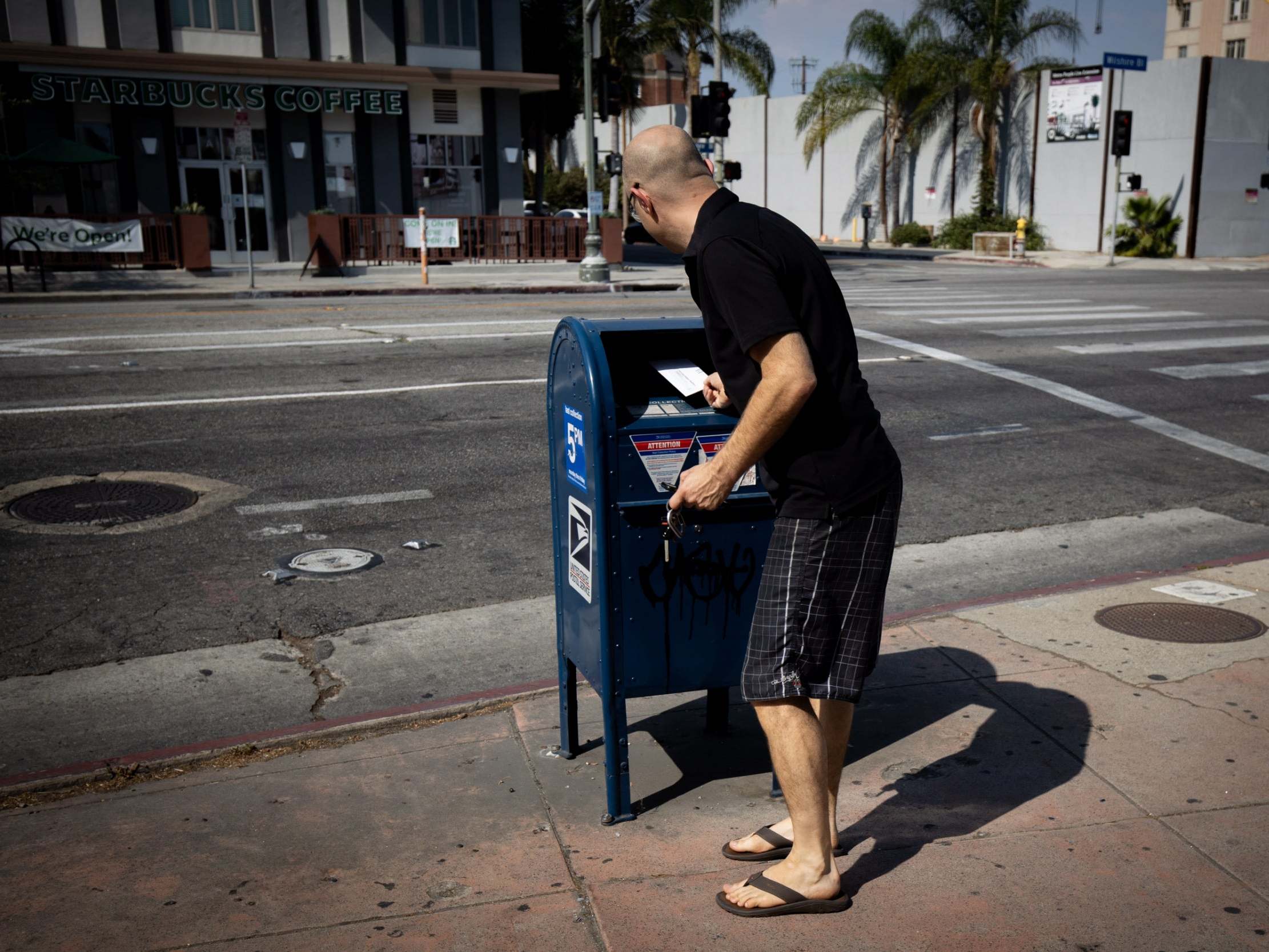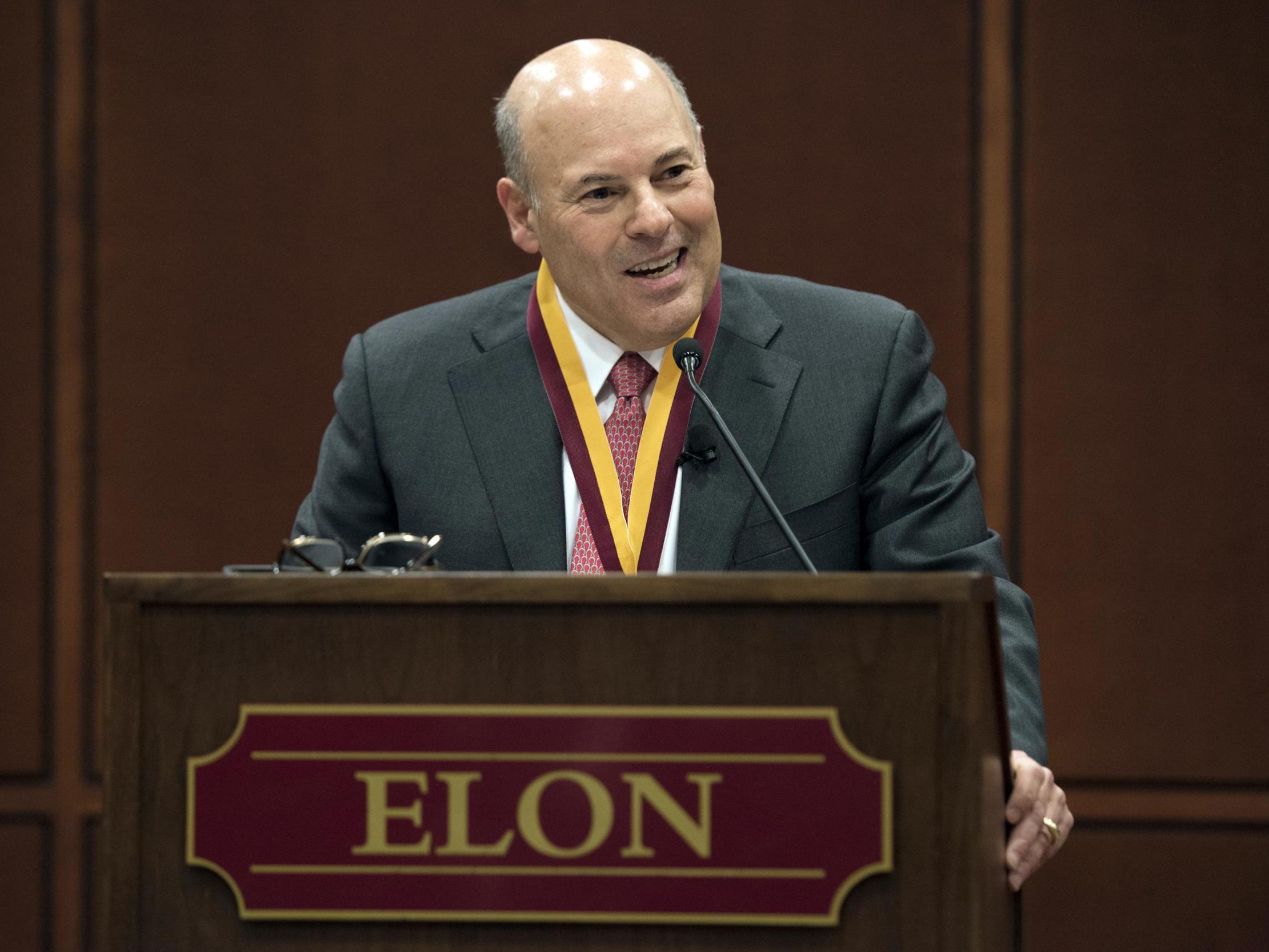'He knows how to destroy a company': Inside Donald Trump’s campaign to sabotage the postal service and steal the election
Donald Trump has launched an unprecedented attack on the postal service in an effort to influence the 2020 election, writes Richard Hall

In mailrooms across the country, letters and packages are piling up. People who rely on the postal service for their medication and paychecks are accosting mail carriers on the street.
The cause of the chaos is plain for all to see, and appears to be deliberate. Mailboxes are disappearing from the streets, letter sorting equipment is being removed from offices and new rules are being introduced by the new boss of the postal service that is slowing deliveries.
“We have one of the largest processing centres in the country, and we have mail backed up for days and weeks, all over the place. You could wallpaper our big building with mail,” said Nick Casselli, a mail worker union president in Philadelphia.
The changes in question would have drastically impacted the postal service’s ability to deliver mail in normal times. But they come in the midst of a pandemic, ahead of an election in which a record number of people will vote by mail. They come at a time when the president himself is attacking the integrity of mail-in ballots almost daily, without evidence, and holding up vital funding.
The timing, postal workers say, is no accident. Along with election experts and Democratic lawmakers, they are warning that the changes pose a grave threat to the integrity of the upcoming presidential election, and are an attempt by the Trump administration to undermine the democratic process.
“This is a deliberate attempt to affect the upcoming presidential election,” Mr Casselli said. “He needs the American public to turn on the postal service. That ruins the ballots in November.”
The proposition that a sitting president would try to weaken the postal service to help his reelection bid would sound like a wild conspiracy theory had Mr Trump not himself admitted that was his intention.
I think the motivation is quite clear. Donald Trump sees mail-in balloting as a threat to his reelection, and so he's seeking to dismantle the post office
After weeks of attacking the post office and its ability to handle mail-in ballots in the upcoming election, Mr Trump offered a frank explanation last week about why he was blocking emergency funding for the service in the next coronavirus stimulus bill.
“They need that money in order to make the Post Office work so it can take all of these millions and millions of ballots,” he told Fox Business. “But if they don’t get those two items, that means you can’t have universal mail-in voting, because they’re not equipped to have it.”
Mr Trump’s own statements make the clear link between his election prospects and his attacks on the US postal service. Since the nomination of Joe Biden as the Democratic nominee, Mr Trump’s position has steadily declined to the point where his reelection is in serious doubt. As his polling numbers have fallen, his attacks on the integrity of mail-in ballots have increased. He now frequently suggests, without evidence, that they are vulnerable to fraud — a claim that no independent election expert supports and for which he has provided no evidence.
His attacks have become a rallying point for Democrats in recent days. Lawmakers in both Houses have called for hearings and bills to examine the changes being implemented.
“I think the motivation is quite clear. Donald Trump sees mail-in balloting as a threat to his reelection, and so he's seeking to dismantle the post office,” Democratic congressman Eric Swalwell, told The Independent.
The worst-case scenario, he added, is that “millions of Americans could be disenfranchised” or dissuaded from casting their vote in a cloud of confusion created by the president.
“I fear that just the spectre of it creates enough confusion because now people will wonder if their vote will even be counted,” said Mr Swalwell, a House representative from California, who was a signatory of a letter signed by more than 170 House Democrats to the postmaster general raising concerns about the changes.

In an apparent effort to hobble people’s ability to vote by mail, Mr Trump has blocked much-needed funding for the postal service to help it deal with the pressures of the coronavirus.
House Democrats have called for $25 billion for the post office as part of a $3 trillion coronavirus relief package. That package would also include $3.6bn for election funding to help states meet the demands of holding a vote during the pandemic. The White House has rejected that proposal, citing Mr Trump’s false claims that granting the funding would lead to fraud.
But the funding fight is one part of a wider campaign to hobble the postal service, which is relied upon by millions for prescription deliveries, paychecks and bills. Drastic changes to the way the postal service operates being made in parallel to Mr Trump’s attacks have election experts worried.
Some of these changes have been planned for months, but the new head of the postal service, Louis DeJoy — a major Trump donor — has implemented further reforms which have dramatically impaired the ability of postal workers to deliver mail on time.
The appointment of the postmaster general is decided by a board of governors which is appointed by the Trump administration. When Mr DeJoy was picked for the role in May this year, Democrats immediately cried foul.
"The idea that we would appoint and accept the appointment of a partisan political donor with no credentials ... is reckless and irresponsible ... and a stick in the eye by Trump to a service Americans count on every day," Virginia congressman Gerry Connolly said at the time.
Mr DeJoy is a political ally of Mr Trump and donated $1.2million to his campaign between 2016 and 2020, according to campaign finance reports compiled by the Federal Elections Commission (FEC).
Many of the changes have been implemented under the guise of cost cutting and efficiency. Since his appointment, the postal service has banned employees from working overtime and making extra trips to deliver mail. The removal of postboxes and mail sorting equipment has also picked up pace. In some mailrooms, work hours are being cut and mail left behind.
Mr DeJoy has insisted that these changes are necessary because the USPS has faced a dramatic drop in revenue due to the coronavirus, amounting to some $2.2bn in the last three months. The new measures are already having an adverse impact on the ground.
“We are seeing equipment removed. It’s not crippling our operation yet, but it’s part of a bigger problem,” said Kimberly Karol, a postal worker in the swing state of Iowa.
“They have initiated a pilot programme that changes how we handle unprocessed mail that is much more inefficient. We are having to double handle mail and in many cases leave mail behind, or carriers have to come back multiple times to get mail.”

Similar changes have impacted mail delivery across the country, including in many swing states that could decide the result of the election.
In June, union officials were told that 671 mail sorting machines would be taken out of service due to a “reduction to letter and flat mail volume,” the New York Times reported.
A number of battleground states were severely impacted by those reductions: Some 24 machines were removed in Ohio, as well as 11 Michigan and Florida respectively, nine in Wisconsin, eight in Philadelphia and five in Arizona.
In the area that Mr Casselli represents in Philadelphia, five mail processing machines have been taken out.
“They process over 100,000 pieces of mail a day. That’s 500,000 pieces of mail. When you keep taking away machinery, a domino effect is going to take place. Less machines, less mail delivery,” he said.
“Trump is no dummy. He knows how to destroy a company,” he added.
Similar delays have been reported in Maine and Oregon.
The problem may be much bigger when the ballots start to roll in. Because of the pandemic, more Americans will vote by mail in this election than ever before. While voting rules differ state-by-state, nearly half have introduced changes to grant easier access to mail-in voting, which in many was previously only available for specific reasons.
A New York Times analysis found that at least three-quarters of all voters will be eligible to vote by post — which experts say could amount to some 80 million ballots rushing through mailrooms.
Compared to the rush the postal service sees at Christmas, when it handles some 500 million pieces of mail every day, that might not seem a lot. But the confluence of funding struggles, workplace changes and equipment reduction introduced by Mr DeJoy means that the ability of postal workers to deliver ballots on time is under threat.
There is evidence, too, that many more Democrats plan to vote by mail than Republicans. According to a WSJ/NBC News poll published this week, some 47 percent of voters who back Mr Biden plan to vote by mail, compared to 11 percent of Trump voters.
The looming crisis prompted the Postal Service to send letters to 46 states and D.C. warning that it could not guarantee that all ballots sent by mail for the presidential election would arrive in time to be counted — even if the voters followed all the rules.
“The Postal Service is asking election officials and voters to realistically consider how the mail works,” Martha Johnson, a spokeswoman for the USPS, told the Washington Post in a statement.
The Post reported that the warnings were issued at the end of July, but planned from before Mr DeJoy took up his role.
Nonetheless, Mr DeJoy’s actions have drawn the ire of Democrats. A letter written by House Speaker Nancy Pelosi and Carolyn Maloney, a congresswoman and chair of the Committee on Oversight and Reform, and signed by 192 other House Democrats, to raise “serious concerns” about the changes he has implemented.
Ms Maloney, who represents a district in New York, told The Independent that Mr DeJoy’s “drastic changes in the midst of a pandemic and only months before a presidential election in which tens of millions of ballots will be cast by mail, are extremely irresponsible.”
“These changes have caused confusion between management and postal workers on the ground who provide essential services to the American people. The Trump Administration must stop undermining the Postal Service, and ensure it follows past precedent to prioritize election mail so that ballots are delivered to voters and boards of election in time to be counted,” she added.
While the letter stopped short of accusing Mr DeJoy of being part of a Trump administration plan to undermine the election, others have not.
“I think the president has put in place somebody who has been directed to dismantle the post office, to bring it to its knees,” said Mr Swalwell.
“The worst part about that is that it’s during a pandemic when people are trying to be good citizens and not leave the house. At the time when they need [the post office] the most, he is preventing them from doing their duty.”
Join our commenting forum
Join thought-provoking conversations, follow other Independent readers and see their replies
0Comments